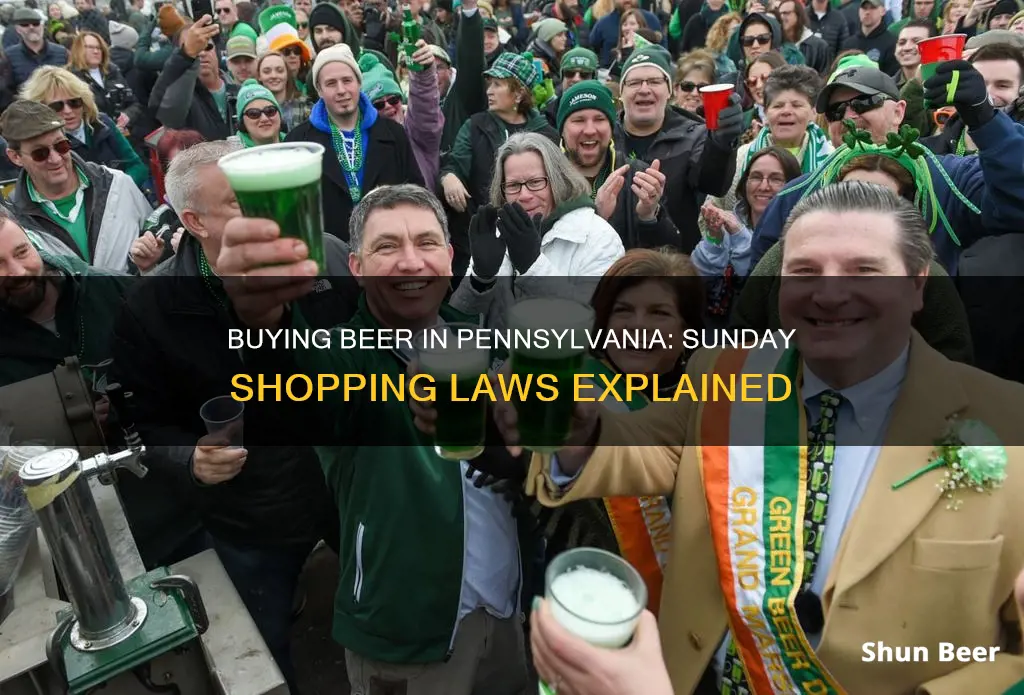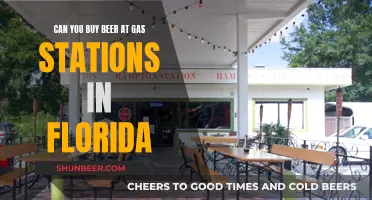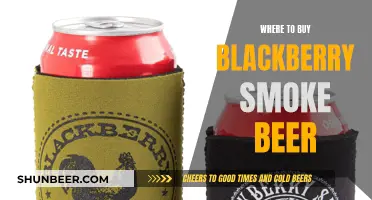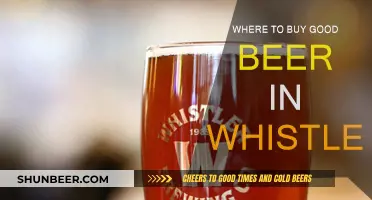
Pennsylvania has some of the strictest alcohol laws in the United States, which can be traced back to the Prohibition era and the influence of Gifford Pinchot, who served as governor from 1923 to 1935. These laws have a significant impact on when and where you can buy beer, and whether you can buy it on a Sunday. So, can you buy beer on a Sunday in Pennsylvania?
| Characteristics | Values |
|---|---|
| Can you buy beer on Sunday in Pennsylvania? | Yes |
| When can beer be purchased on Sundays? | From 9 a.m. to 9 p.m. with a Sunday Sales Permit |
| Where can you buy beer on Sundays? | Bars, restaurants, beer distributors, breweries, retailers with eating places or cafes, and gas stations |
| Are there any restrictions on the quantity of beer purchased on Sundays? | It depends on the type of license the retailer has. Some retailers can sell up to 192 fluid ounces of beer per purchase. |
| Are there any dry counties in Pennsylvania? | No, but there are municipalities that are at least partially dry |
What You'll Learn

Beer can be purchased on Sundays in Pennsylvania
Bars and restaurants can sell beer on Sundays between 9 a.m. and 2 a.m. the following morning, provided they have a Sunday Sales Permit. Beer distributors and breweries are permitted to sell beer on Sundays from 9 a.m. to 9 p.m. with a Sunday Sales Permit. Retailers with eating places or cafes are authorised to sell beer on Sundays from 11 a.m. to 2 a.m. Monday morning.
While specific locations with the necessary licenses may open later on Sundays, they are prohibited from opening earlier.
Pennsylvania's liquor laws have a long history, dating back to the Prohibition era. Even after Prohibition was repealed, Governor Gifford Pinchot maintained a tough stance on alcohol control. He believed that the best way to prevent corruption in the alcohol industry was through state control, which led to the creation of the Pennsylvania Liquor Control Board.
Today, Pennsylvania's alcohol laws remain complex and are considered some of the strictest in the United States. The state has a quota system for liquor licenses, with one license allotted for every 3,000 county inhabitants. There are various types of licenses, including retail liquor licenses, which allow for the sale of liquor, wine, malt, and brewed beverages, and retail dispenser licenses, which are limited to the sale of brewed and malt beverages.
The rules for purchasing beer in Pennsylvania vary depending on the day of the week and the type of establishment. Licensed retail locations, including bars and restaurants, can sell beer from 7 a.m. to 2 a.m. Monday through Saturday. Gas stations in Pennsylvania are permitted to sell beer from 2 a.m. Monday to midnight Saturday, with a limit of two 6-packs per transaction. Grocery stores operate under similar restrictions as gas stations, but with some differences in hours of operation.
Pennsylvania's beer laws can be tricky to navigate, with various licenses and regulations in place. However, it is clear that beer can be purchased on Sundays, with certain time restrictions and permit requirements in place.
Colorado Nightlife: Beer Buying Hours
You may want to see also

Each location type has different Sunday sale stipulations
Pennsylvania's liquor laws are notoriously complex, and this complexity extends to the sale of beer on Sundays. The day of the week and the type of location both influence the regulations surrounding beer sales.
Bars and restaurants with the proper permits can sell beer on Sundays between 9 a.m. and 2 a.m. the following morning. Beer distributors and breweries are permitted to sell beer on Sundays from 9 a.m. to 9 p.m. with a Sunday Sales Permit. Retailers with eating places or cafes may sell beer on Sundays from 11 a.m. to 2 a.m. Monday morning.
It is important to note that these locations require specific licenses to sell beer, and a Sunday Sales Permit is mandatory for selling beer on Sundays. While some locations may have extended hours on Sundays, they are not authorised to open earlier than their permitted times.
Pennsylvania's liquor laws have a long history, dating back to the Prohibition era and Governor Gifford Pinchot, who was a vocal opponent of alcohol. The Pennsylvania Liquor Control Board, established in 1933, is responsible for licensing establishments, regulating prices, and setting serving hours. While the laws have evolved over time, with some restrictions being loosened, the state's liquor regulations remain among the most intricate in the country.
Kansas Beer Laws: Sunday Shopping Limits Explained
You may want to see also

Pennsylvania's liquor laws are restrictive
One example of the state's restrictive liquor laws is the requirement for retail establishments selling alcohol to be licensed. The Liquor Control Board operates on a quota system, currently allowing one license per 3,000 county inhabitants. There are several types of liquor licenses available, including retail liquor licenses and retail dispenser licenses. Retail liquor licenses allow for the sale of liquor, wine, malt, and brewed beverages for consumption on-premises, while retail dispenser licenses are limited to brewed and malt beverages only.
Another peculiarity of Pennsylvania's liquor laws is the restriction on the amount of alcohol that can be sold for off-premises consumption. For example, brewed or malt beverages can be sold in quantities less than or equal to 192 ounces (typically 6-packs or 12-packs of beer). This means that many bars and restaurants also function as beer stores. Additionally, there are restrictions on the hours during which alcohol can be sold, with licensed retail locations permitted to sell alcohol from 7 am to 2 am Monday through Saturday, and from 9 am to 2 am on Sundays with a proper permit.
Pennsylvania's liquor laws have seen some changes in recent years, with Governor Tom Wolf signing Acts 39 and 166 into law in 2016, loosening restrictions on beer and wine sales and allowing for expanded state store hours. However, the state's liquor laws remain restrictive and can be challenging to navigate for both residents and visitors.
Exploring Beer Options at Juno Beach Pier
You may want to see also

Pennsylvania's liquor laws have recently loosened
Pennsylvania's liquor laws have long been considered some of the most restrictive in the United States. The state's complex alcohol laws can be traced back to the Prohibition era and the stance of Gifford Pinchot, who served as governor from 1923 to 1935. Pinchot was a teetotaler who, even after Prohibition was repealed during his second term, maintained his tough stance on alcohol control. He established the Pennsylvania Liquor Control Board to license establishments, set serving hours, and regulate prices, with the goal of making the purchase of alcoholic beverages as inconvenient and expensive as possible.
However, Pennsylvania's liquor laws have recently loosened, making buying alcohol more convenient. In 2016, Governor Tom Wolf signed Acts 39 and 166, loosening restrictions on beer and wine sales, shipping, and store hours. Act 39, which went into effect on August 8, 2016, allowed for wine sales at supermarkets, restaurants, and hotels, as well as additional alcohol licenses for retailers. It also removed the Sunday ban on alcohol sales, allowing stores to sell liquor from 11 am until 7 pm on Sundays, depending on the district, county, and store classification.
While these changes have made it easier to purchase alcohol in Pennsylvania, the state's liquor laws remain complex. Retail establishments selling alcohol must be licensed, and there are various types and sub-categories of liquor licenses available. For example, a retail liquor license allows for the on-premises sale and consumption of liquor, wine, malt, and brewed beverages, while a retail dispenser license is limited to brewed and malt beverages only.
The state also has a quota system for liquor licenses, with the current quota set at one license per 3,000 county inhabitants. This has resulted in a patchwork of "wet" and "dry" municipalities across the state, with some communities being partially dry. Additionally, while beer, wine, and liquor can now be purchased in more locations, they still cannot be bought to drink at home all in the same place.
In summary, while Pennsylvania's liquor laws have recently loosened, the state continues to have some of the most complex and restrictive alcohol regulations in the country. The recent changes have made it somewhat easier for residents to purchase alcohol, but the licensing system and varying local regulations can still make it confusing for consumers to navigate.
Buying Beer at Gas Stations in New Orleans
You may want to see also

Beer can be delivered in Pennsylvania
Pennsylvania has some of the strictest alcohol regulations in the United States, which can be traced back to the Prohibition era. While you can buy beer on Sundays in Pennsylvania, the rules vary depending on the type of location. Bars and restaurants can sell beer between 9 a.m. and 2 a.m. on Sunday with a proper permit, while beer distributors and breweries can sell from 9 a.m. to 9 p.m. with a Sunday Sales Permit. Retailers with eating places or cafes may sell beer on Sundays from 11 a.m. to 2 a.m. Monday.
Beer delivery is legal in Pennsylvania and is an option for breweries and restaurants. These establishments may sell and deliver beer between 8 a.m. and 11 p.m. Monday through Saturday and on Sunday with a Sunday Sales Permit. Curbside pickup is also available. Delivery services like GoPuff can be used, but Drizly.com, the leading delivery service for beer, is currently unavailable in the state.
Pennsylvania's complex alcohol laws can be attributed to the state's stance on alcohol control following the Prohibition era. Gifford Pinchot, who served as governor from 1923 to 1935, maintained a tough stance even after Prohibition was repealed during his second term. Pinchot established the Pennsylvania Liquor Control Board to license establishments, regulate prices, and set serving hours. The state's liquor laws have recently loosened, with Governor Tom Wolf signing Acts 39 and 166 into law in 2016, making it more convenient to purchase alcohol.
Where to Buy Medalla Beer in Texas?
You may want to see also
Frequently asked questions
Yes, you can buy beer on Sundays in Pennsylvania, but the timings and rules vary depending on the type of location.
Bars and restaurants can sell beer between 9 a.m. on Sunday and 2 a.m. on Monday with a proper permit.
Beer distributors and breweries can sell beer from 9 a.m. to 9 p.m. on Sundays with a Sunday Sales Permit.
Retailers with eating places or cafes may sell beer from 11 a.m. on Sunday to 2 a.m. on Monday.







